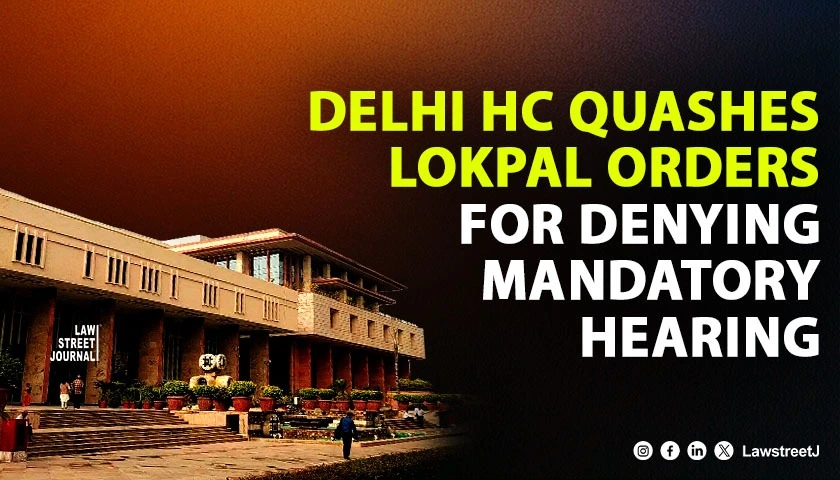New Delhi: The Delhi High Court has delivered a significant judgment on procedural safeguards under the Lokpal and Lokayuktas Act, 2013, by quashing two orders passed by the Lokpal of India against a public servant, Mujahat Ali Khan. The Court held that the Lokpal’s failure to grant Mr. Khan the mandatory opportunity of being heard before directing a detailed investigation into corruption allegations vitiated the entire proceedings.
The verdict was pronounced on November 14, 2025, by a Division Bench of Hon’ble Mr. Justice Anil Kshetarpal and Hon’ble Mr. Justice Harish Vaidyanathan Shankar in Mujahat Ali Khan v. Lokpal of India.
The case stems from Complaint No. 190/2024 lodged before the Lokpal alleging manipulation of OMR sheets in exchange for a bribe during a Departmental Promotion Examination for the post of Chief Loco Inspector conducted by the West Central Railway in May 2023. Although Mr. Khan was declared successful in the examination, he was not originally among the five named Respondent Public Servants who received show-cause notices and were heard by the Lokpal.
After considering the Preliminary Inquiry Report submitted by the Central Bureau of Investigation (CBI), the Lokpal passed the first impugned order on February 21, 2025, concluding that a prima facie case existed and directing the CBI to conduct a detailed investigation under Section 20(3)(a) of the Lokpal Act.
Subsequently, the CBI registered an FIR on March 11, 2025, naming Mr. Khan as an accused (RPS-6) for the first time. After the Investigation Report was submitted, the Lokpal issued its second impugned order on September 23, 2025, calling upon Mr. Khan, among others, to furnish comments under Section 20(7) of the Act.
Mr. Khan approached the High Court arguing that the entire proceedings were void ab initio because he was never afforded the mandatory hearing under Section 20(3) of the Lokpal Act prior to the direction for investigation and the subsequent registration of the FIR.
The High Court agreed, emphasising the mandatory nature of Section 20(3), which explicitly states that the Lokpal “shall,” after giving the concerned public servant an opportunity of being heard, decide whether a prima facie case exists to order an investigation.
“The language employed in Section 20(3) of the Lokpal Act is peremptory and admits of no discretion,” the judgment stated. “Omission of this step, especially when it results in the registration of an FIR and the initiation of a criminal investigation, constitutes a violation of the statutory mandate and of the principles of natural justice.”
The Court rejected the Lokpal’s contention that Mr. Khan’s later participation by filing comments at the post-investigation stage under Section 20(7) cured the initial procedural defect. The Bench clarified that Sections 20(3) and 20(7) are “independent and individual requirements mandated under the law,” and compliance with one cannot substitute compliance with the other.
Highlighting the “stringent and penal consequences” that may follow merely from a public servant being named in a Lokpal complaint—including transfer, suspension, or attachment of assets—the Court underscored the need for “strict adherence to the procedural and substantive safeguards prescribed under the statute.”
In conclusion, the High Court allowed the writ petition, quashing and setting aside the impugned orders dated February 21, 2025, and September 23, 2025, insofar as they relate to Mr. Khan. However, it clarified that the Lokpal remains at liberty to initiate proceedings afresh against him, provided it strictly adheres to the procedure under Section 20 of the Lokpal Act.
Case Name: Mujahat Ali Khan v. Lokpal of India through Under Secretary
Case No.: W.P.(C) 16035/2025
Coram: Hon’ble Mr. Justice Anil Kshetarpal and Hon’ble Mr. Justice Harish Vaidyanathan Shankar
Date of Judgment: November 14, 2025
Neutral Citation: 2025:DHC:9986-DB
Appearing for Petitioner (Mujahat Ali Khan):
- Mr. Hitesh Kumar, Advocate
- Mr. Nishant Singh, Advocate
- Mr. Vishal Yadav, Advocate
Appearing for Respondent (Lokpal of India):
- Mr. Nishant Katneshwar, Advocate
- Mr. Vijay Singh, Advocate



![Delhi High Court Sets Aside Arbitral Tribunal's Award Against NHAI in Highway Project Delay Case [Read Judgment]](/secure/uploads/2023/07/lj_9605_23374c2e-392c-4491-a2fe-f2f12fc5272f.jpg)
![Delhi Court Rejects Stay Request in Defamation Case Against Rajasthan CM Ashok Gehlot [Read Order]](/secure/uploads/2023/08/lj_5208_80de1ddc-d76a-4f7f-b180-408e3ae14fb4.jpg)





